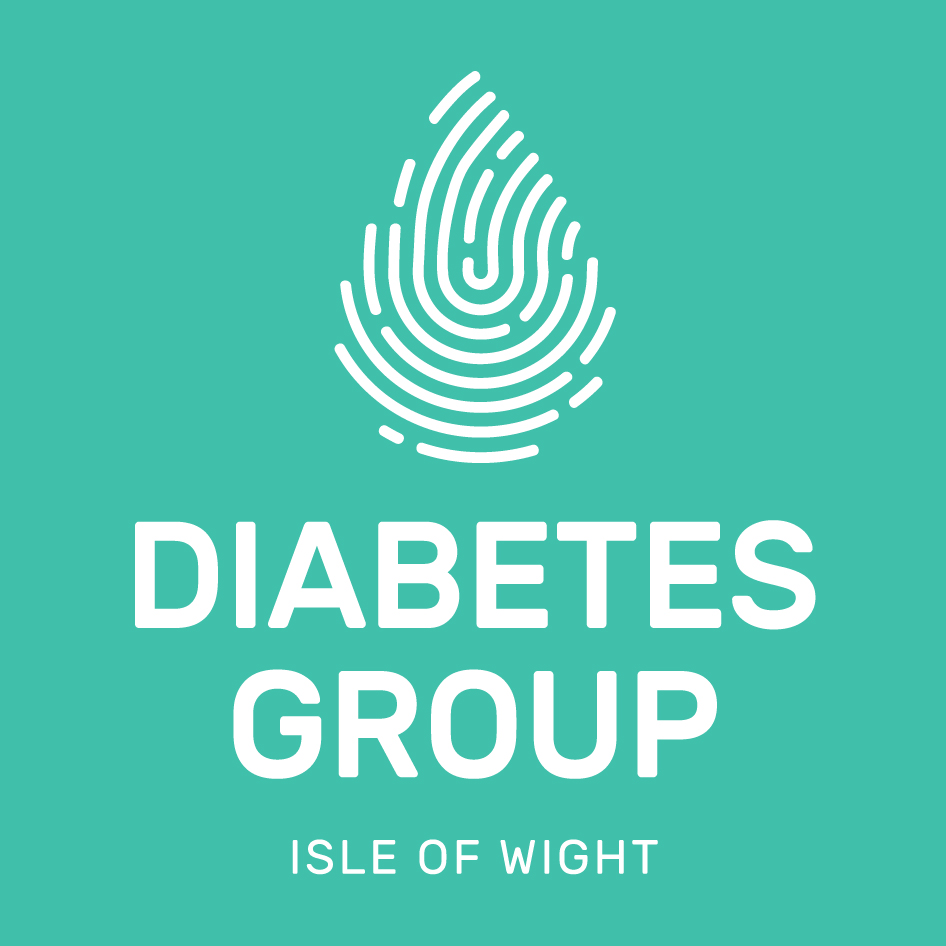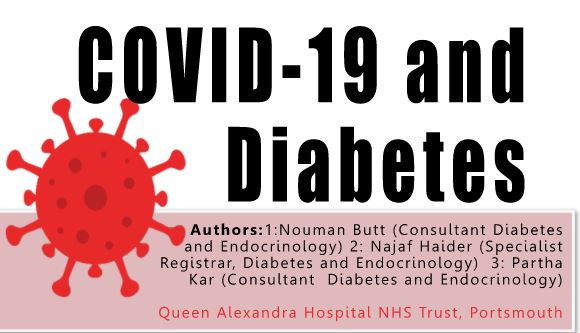COVID-19 and Diabetes
Authors: 1:Nouman Butt (Consultant Diabetes and Endocrinology), 2: Najaf Haider (Specialist Registrar, Diabetes and Endocrinology). 3: Partha Kar (Consultant Diabetes and Endocrinology)
Queen Alexandra Hospital NHS Trust, Portsmouth
The first case of a new illness was reported to the World Health Organization (WHO) in December 2019 and was declared a public health emergency of international concern soon after that. The modern era of global connectivity and faster travel times meant that cases of this mysterious illness were soon reported across the globe. Specialists reported an increasing number of people being unwell caused by the ‘2019 novel coronavirus’. The new virus was named as ‘severe acute respiratory syndrome coronavirus 2 (SARS-CoV-2) and the disease caused by it was labelled COronaVIrus Disease 2019 (COVID-19) in February 2019.
At the time this article was written 284,900 people tested positive for COVID-19 and 44,918 have sadly died across all settings in the UK. The Office of National Statistics (ONS) has estimated an average of 14,000 people in the community in England had COVID-19 infection between 22nd June and 5th July 2020. The modelling however showed a downward trend nationally in the number of new cases being identified.
A new disease comes with its own challenges – the most important being questions like where, when and why it effects a certain group of people and how to treat it. As epidemiologists kept a meticulous record of details a pattern started to emerge – giving clinicians the ability to stratify at-risk groups into ‘clinically extremely vulnerable group’ and ‘clinically vulnerable group’. People with diabetes fall in the latter group.
I have Diabetes…will I catch Coronavirus?
An important point to clarify here is that having diabetes – type1, type 2, gestational or any other type – does not make necessarily you more likely to catch coronavirus. However, people with diabetes have a higher risk of getting a severe illness from the coronavirus infection but this will vary from person to person. It has been reported that majority of people who contract coronavirus, regardless of the presence of Diabetes, have mild symptoms similar to a common cold. Research shows that certain groups are at a higher risk – those from a Black, Asian and minority ethnic (BAME) group (up to 6 times higher risk as compared to white ethnicity), higher body mass index (BMI >30), higher HbA1c, increasing age and those with other problems such as heart or kidney disease.
What if I am unwell with Coronavirus?
Being unwell changes the way the body handles the glucose. As the body’s defenses, the immune system, fight an infection this may make it more difficult to keep blood glucose in range and also an increased risk of very high glucose levels. Persistent high glucose levels can lead to severe dehydration and use of fat as fuel for energy production which may lead to diabetic ketoacidosis (DKA) or hyperosmolar hyperglycemic state (HHS) – both being diabetic emergencies. Furthermore, data from recent studies have suggested that during coronavirus infection, people with any type of diabetes have an increased risk of DKA. The exact mechanism is still unclear and may involve changes in special proteins at cellular level (receptors) causing resistance to the effect of insulin or direct injury to cells that make insulin.
The basic advice to try and prevent having worse outcomes with COVID19 when you have diabetes is to try and tackle the factors you can modify. Age and ethnicity are not issues one can change- yet one can attempt to look at issues such as weight and glucose control
The Sick-Day Rules
Following sick day rules is the cornerstone in managing diabetes when feeling unwell and the same applies if you think you may have coronavirus infection. Stay calm and contact your Diabetes team at your GP surgery or hospital if you have any questions. They can provide you with specific advice depending on your type of diabetes and the treatment you are on. Some general rules are as follows:
- Stay hydrated with non-sweetened drinks and take regular small meals.
- If you are not able to eat much, try to have snacks or drinks with carbohydrates.
- If you self-monitor your glucose, keeping a check on glucose levels is ever important and during sickness this should be done every 4 hours (even during the night).
- If you have Type 1 diabetes please check your ketones regularly to pick up early signs of ketosis.
- An important reminder is that if you are taking any of the newer tablets called SGLT2 inhibitors (such as empagliflozin, dapagliflozin, canagliflozin) then these need to be stopped immediately and further advice sought from your healthcare team.
- If you visit the hospital, make sure you let them know that you have diabetes and provide them with your diabetes medication list. Take your diabetes essentials with you such as medications, insulin, glucose meter, sensor reader, pump etc.
- You can always ask for urgent medical help by dialing 999.
There is extensive advice available on sick day rules at Diabetes UK website. (www.diabetes.org.uk)
Does social distancing still apply?
From the 4th of July, the rules around social distancing have been relaxed by the government. This means an increased opportunity to meet friends and by, what now seems like being pampered, getting a haircut. However, it is important to be mindful of the fact that the coronavirus is still in general circulation and measures to protect oneself must be strictly adhered to. This means social distancing, regular hand hygiene and other measures recommended by the government such as wearing a mask when in closed public spaces. It is not being selfish to ask someone if they have any coronavirus symptoms before arranging a meet up – and to avoid doing so if there are any symptoms however mild or unrelated, they may seem.
Learning in progress…
COVID-19 is a new disease in humans – only six to eight months at most at current estimates. Much needs to be learnt about the coronavirus itself and how it effects different population groups especially those with Diabetes. Understanding more about this new virus may also help us better understand the mechanisms underlying diabetes itself – leading to improved detection and novel treatment options for the future. For now, the best way is to follow plans with your healthcare team and government advice.


